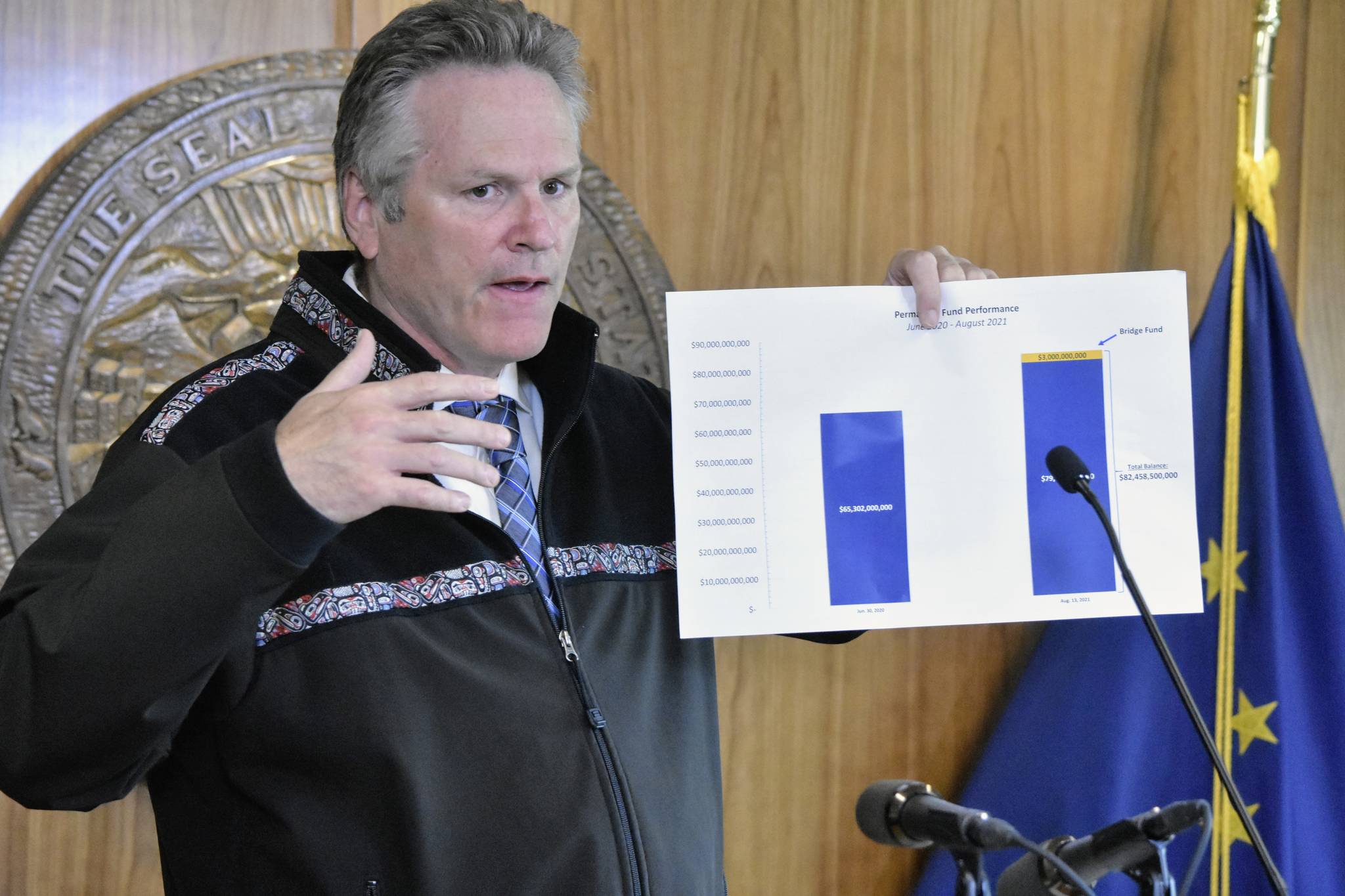Lawmakers are asking Gov. Mike Dunleavy to add an appropriations bill to the call of the special session of the Alaska State Legislature that began Monday, allowing the body to fully fund the state’s budget and set an amount for this year’s Permanent Fund Dividend.
The leaders of all four caucuses were scheduled to meet with the governor Monday afternoon to discuss amending the call. At the end of the business day, talks were still ongoing.
The state’s budget is only partially funded after the deeply divided Legislature was unable to secure the three-quarter vote necessary to release funds from the state’s Constitutional Budget Reserve fund. But when a governor calls the Legislature into a special session, lawmakers are limited to the items listed by the governor.
In a letter addressed to her colleagues and the governor, House Speaker Louise Stutes, R-Kodiak, urged Dunleavy to amend his call to a special session allowing for an appropriations bill to be discussed. But at a news conference Monday Dunleavy said he expected lawmakers to come together to resolve the state’s long-term fiscal issues.
[Dividend size is a sticking point for special session]
But Stutes said completing the budget was more pressing, and was extremely critical of the governor for what she said was political maneuvering.
“Hold the PFD and other essential government programs hostage while we work towards a solution is unconscionable and counterproductive to compromise,” Stutes said in the letter.
In a meeting with reporters, Stutes said the governor’s planned constitutional amendments left a hole in the budget without proposals for filling it.
“That’s not a fiscal plan,” Stutes said.
But Dunleavy said it was lawmakers who needed to come together with a compromise behind a comprehensive solution.
“We’ve given them plenty of options, plenty of suggestions,” Dunleavy said at the conference. “They’re struggling themselves, they’re going to have to come around on something. My job is to implement the laws, they’re going to have to come around on something, sooner or later, sooner is better for all of us, later is going to continue the chaos.”
Since the last special session a legislative workgroup has been working on suggestions for resolving the state’s long-term fiscal issues and on Monday released a list of recommendations.
The group recommended the two funds of the Alaska Permanent Fund be combined into a single fund, and that the state use a 5% of market value draw each year to fund the state government. The report also recommends the legislature “work towards” the proposed 50-50 formula where half of that draw is spent on state government and the other half on Permanent Fund Dividends.
But while the report gave specific amounts of how much the state should expect to spend each year, how much it should cut and what new revenues could be found remained vague.
“While specific budget reduction options were discussed, the (workgroup) believes that the greatest potential for reductions will be realized through structural and statutory reforms that maintain levels of service but improve efficiency,” the report says.
However, what those structural cuts are, the report doesn’t say. In an interview with reporters Monday, Sen. Jesse Kiehl, D-Juneau, a member of the workgroup, said the recommendations were a starting point and an improvement from previous calls for larger cuts.
Masks are back
Also Monday, a mask mandate was reinstated at the Capitol complex, despite objection from several members of the Legislative Council, the bicameral committee that oversees rules for the building. Several mostly Republican members argued masking should be a recommendation, not a requirement, but the vote to change the wording ended in a tie, which isn’t enough to pass. Rep. Chris Tuck, D-Anchorage, was the only Democrat to vote against a mask mandate.
Both the Senate and the House of Representatives met briefly Monday and gaveled out until later in the week. The House’s next session is currently scheduled for Wednesday at 2 p.m. and the Senate’s for 10:30 a.m. on Thursday.
Watch the governor’s news conference below:
• Contact reporter Peter Segall at psegall@juneauempire.com. Follow him on Twitter at @SegallJnuEmpire.

